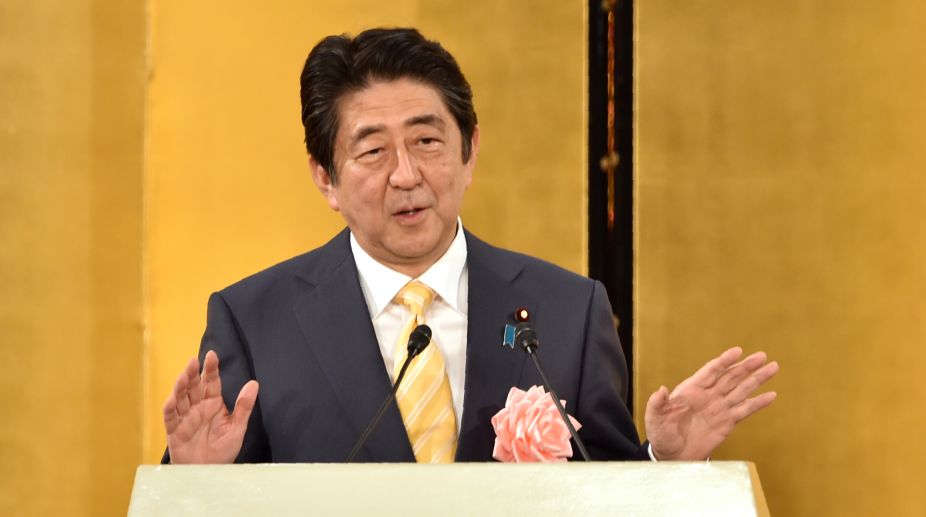Prime Minister Shinzo Abe’s ruling coalition won a resounding victory in Sundays snap election, securing two-thirds majority in the Lower House that raises his chances of achieving a historic third term and his longtime ambition of revising the pacifist Constitution, a media report said.
Media tallies showed the Liberal Democratic Party-Komeito bloc won 312 seats in the 465-member Lower House, a development that would help it call a referendum on amending the US-drafted charter. This would also herald a resurgence in Abe’s drive to amend the supreme code for the first time since it took force 70 years ago, the Japan Times reported.
Advertisement
The LDP endorsed three independents after the poll wrapped up, raising its post-election strength to a total 283, nearly unchanged from the 284 it held before campaigning started, reports said.
Kibo no To (Party of Hope), the upstart headed by Tokyo Gov. Yuriko Koike, struggled at 49 seats.
The Constitutional Democratic Party of Japan, another new party consisting of members who chose not to join Kibo no To, made big headway by bagging 54 seats. This has made the CDP the biggest opposition party.
In a televised interview with Tokyo Broadcasting System right after the election, Abe said his ruling coalition alone won’t call for a referendum on constitutional revision, but instead seek cooperation from other parties.
“Kibo no To members maintain a positive or constructive attitude when it comes to revising the Constitution. I’d like to hold dialogue with other parties, including Kibo no To,” Abe said at the party’s headquarters in Tokyo.
Abe said he will reflect on Sunday’s victory with humility and further scrutinize the results so he can decide whether it represents a public mandate.
It was a remarkable moment for Abe, whose grip on power began slipping in July after his LDP was clobbered by a fledgling party headed by Koike in the Tokyo Metropolitan Assembly election. His Cabinet’s popularity had plunged to its lowest point since he returned to power in 2012, damaged by ministerial missteps, gaffes, Abe’s alleged cronyism and a coverup of politically sensitive data in the Defense Ministry, the Japan Times reported.
The solid showing for the ruling bloc could serve as a powerful public mandate for Abe, adding momentum to his widely rumoured bid next year to run for a historic third term as LDP president. If re-elected, Abe, who briefly held office from 2006 to 2007, could remain in power until 2021, becoming the nation’s longest-serving prime minister.
Kibo no To’s failure to reach its initially predicted position as Japan’s second-largest party presented the first major setback to the populist governor’s surprising political ascent. It fell far short of its pre-election tally of 57 seats.
Vying against Kibo no To for second place was Yukio Edano’s Constitutional Democratic Party of Japan, which rapidly developed a strong base with its call to “Restore Decent Politics.”
The CDP opposes Abe’s plan to amend Article 9 of the Constitution to legitimize the Self-Defense Forces in line with the divisive security laws his ruling bloc rammed through the Diet in 2015.
The opposition slammed Abe’s decision last month to dissolve the Lower House as a self-serving ploy to avoid a grilling in the Diet over his scandals. The questioning had been expected to begin during the extraordinary Diet session called � and immediately dissolved � in September.
Abe, however, said his actions were intended to seek a public mandate for his hard-line attitude toward North Korea and his decision to use the proceeds from the 2019 consumption tax hike to boost education and social security instead of paying down the national debt.
“We can no longer let ourselves be fooled by North Korea. We cannot succumb to its threats. By taking advantage of our strong diplomacy, we have to make sure the North will have no other option but (to) change its policy and return to the negotiating table,” Abe told supporters waving Rising Sun flags at a rally at Akihabara station on Saturday.
Abe added he will work in lockstep with US President Donald Trump to continue to “maximize pressure” on the regime.
All eyes are now expected to turn to what happens next regarding Abe’s plan to revise the Constitution now that his ruling coalition, which boasted a pre-election strength of 325 seats in the previous 475-seat Lower House, has successfully maintained the two-thirds majority of 310 all by itself.
The supermajority is crucial to Abe’s goal of revising the supreme law by 2020.
Abe said Sunday night he will reach out to opposition parties supportive of constitutional revision.











